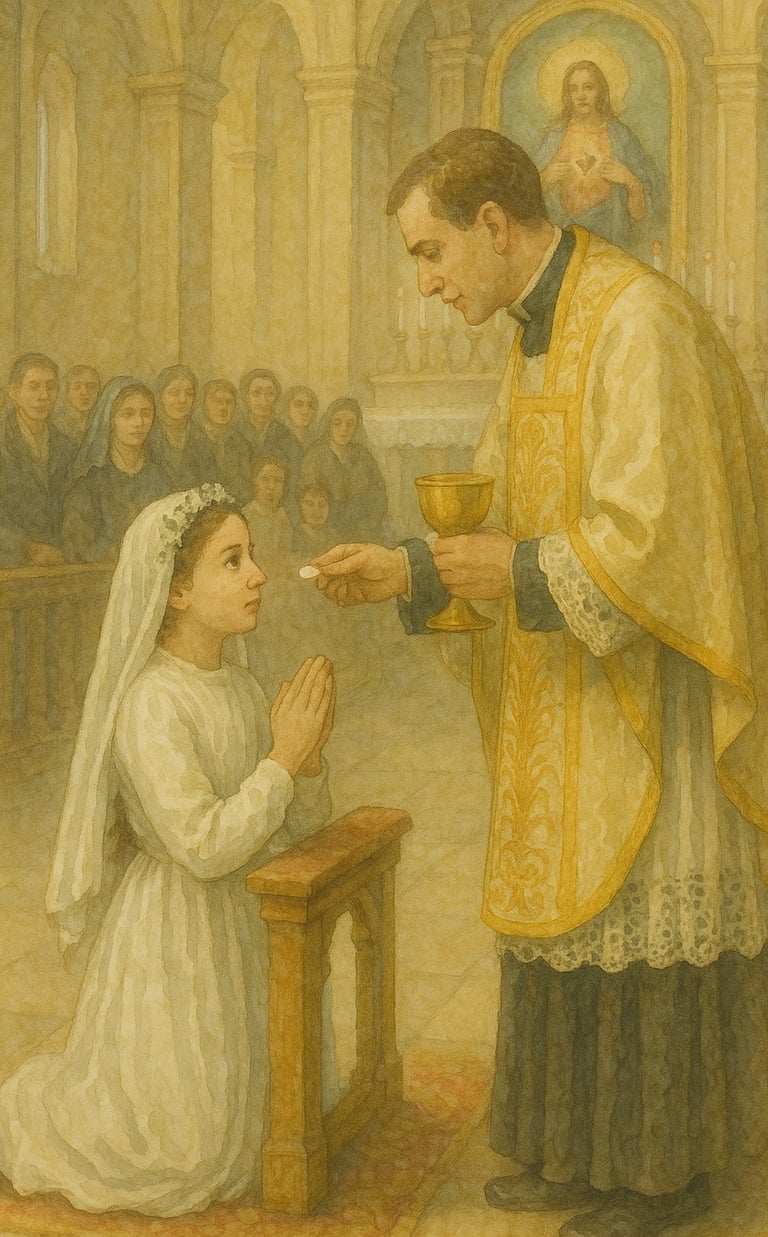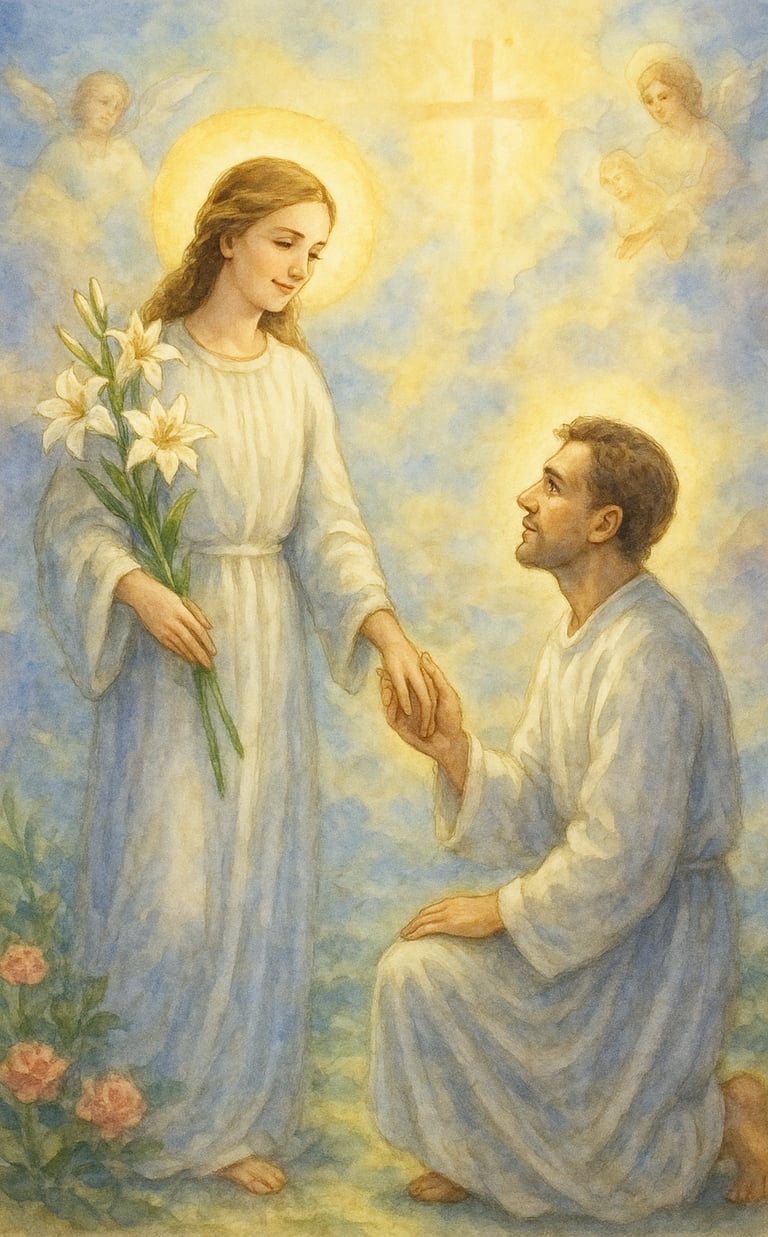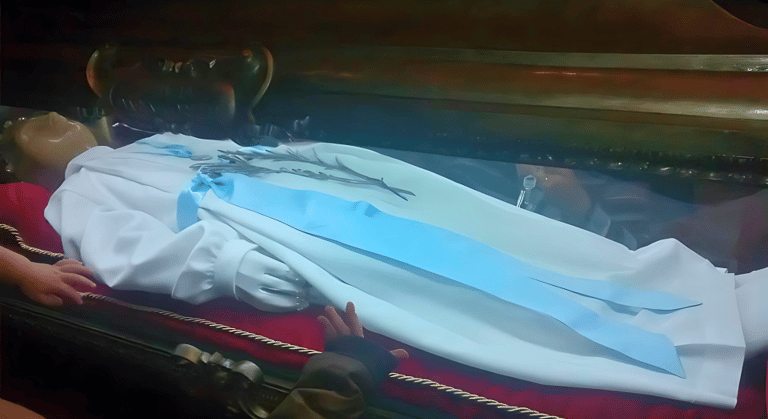St. Maria Goretti
The Innocent Witness of Mercy and Purity
Halo & Light Studios
7/5/20254 min read


Click Link for a reel of Daily Dose of Saints and Faithful Art:
https://youtube.com/shorts/jJpg7rk2PfU
⚠ Sensitive Topic Warning:
This post contains references to sexual violence, martyrdom, and topics related to purity and pornography. Reader discretion is advised, especially for young audiences.
At just eleven years old, St. Maria Goretti chose eternal life over fleeting safety—and forgiveness over vengeance. Her story is a breathtaking testament to heroic courage, radiant purity, and merciful love—a witness that continues to stir hearts around the world.
Born in 1890 in Corinaldo, Italy, Maria was the third of seven children raised in a poor but devout peasant family. After her father died of malaria, the Gorettis relocated to the Pontine Marshes—an undeveloped, mosquito-ridden area offered to families for subsistence farming. In these harsh conditions, Maria’s mother, Assunta, passed on the Catholic faith with simple strength and deep devotion.
From an early age, Maria developed a profound love for Jesus in the Eucharist and for Our Lady. At a time when many children had not yet begun catechism, Maria had already received her First Communion. She was known for her modesty, quiet joy, deep prayer life, and unwavering moral strength.
On July 5, 1902, 20-year-old Alessandro Serenelli—a troubled farmhand who lived with the Gorettis—attempted to assault Maria. She resisted with boldness beyond her years, crying out: “No! It is a sin! God does not want it!” Infuriated by her refusal, Alessandro stabbed her 14 times. Maria survived long enough to receive the sacraments, and to offer her attacker something that seems humanly impossible: “I forgive Alessandro... and I want him with me in Heaven.”
In just eleven short years, Maria attained a depth of sanctity that transformed not only her life—but the lives of all who came after. Many in her situation might have reasoned, “If I just give in, maybe I’ll survive. Who will take care of my mother? My siblings?” But Maria understood a vital truth: The end does not justify the means.
If sin is involved, it cannot be God’s will. We are not called to control every outcome—we are called to be faithful. God will take care of the rest. As Scripture says: “Seek first the Kingdom of God, and all these things will be given you besides” (Matthew 6:33).
Maria’s strength did not arise in a vacuum. She must have learned to love and trust God from the model of her mother, Assunta. In the hidden holiness of that poor and prayerful home, her mother prepared her soul well. And when the moment of testing came, Maria stood firm—and won the martyr’s crown.
Alessandro remained unrepentant for years. But in prison, he had a vision of Maria. She appeared to him, offering white lilies—symbols of purity. The lilies burned in his hands. That moment shattered his pride.
He began to pray. He repented. He begged Assunta for forgiveness, which she gave. After his release, he joined the Capuchins as a lay brother, living out the rest of his life in penance and humility. In a remarkable full-circle moment, Alessandro Serenelli was present at Maria’s canonization in 1950.
Pope Pius XII canonized Maria Goretti before half a million people—the largest crowd in Church history at the time. Among them stood her mother, Assunta—the first parent to ever witness the canonization of her own child.
“Blessed are the pure of heart, for they shall see God.” – Matthew 5:8
But in today’s world, purity is no longer a virtue that is taught—much less honored. It is seen as outdated, even oppressive. The average age of boys' exposure to pornography is now just 8 years old, and the rate of women consuming pornography is rising rapidly, nearly rivaling that of men. Women often read. Men often watch. The results are devastating.
We rarely speak honestly about the long-term consequences of impurity. In the age of OnlyFans, casual hookups, and unlimited access to explicit content, our culture is drowning in hedonism. We have distorted the beauty of marital love and reduced it to selfish pleasure. We've convinced ourselves that fleeting encounters will meet our deep need for connection—and that a momentary escape from loneliness is worth the moral cost.
But this is a lie. And believing it is not strength—it is a tragic form of surrender.
Maria Goretti, a child who died a virgin, shows us what real courage looks like. She tells the modern world that there are things worth dying for: Purity. Truth. Faithfulness to God.
St. Maria Goretti is a patroness for our generation—a world confused about love, dignity, forgiveness, and what it means to be holy. She reminds us that sanctity is not reserved for the old, the educated, or the powerful. Holiness is for anyone— even an eleven-year-old—who loves God with an undivided heart.
St. Maria Goretti, pure lily of Christ, pray for us.
In October 2015, during the Jubilee Year of Mercy, I had just given birth to our fifth child. He was barely a week old when the relics of St. Maria Goretti visited our parish.




